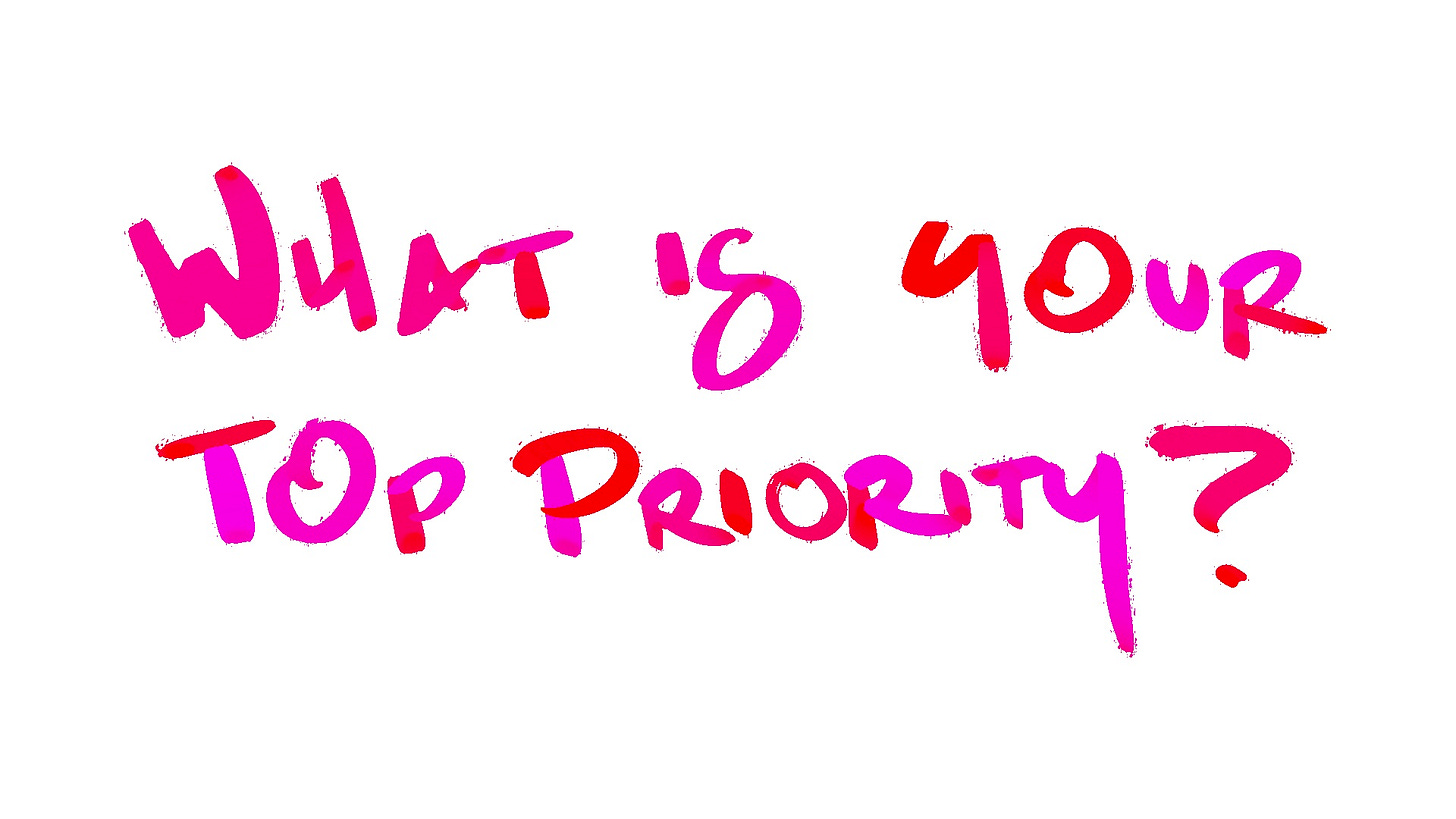What is your top priority?
Last weekend I had a viral infection which led to a (negative) COVID-19 test and several days away from work. On Tuesday it was my birthday. And, on Friday, I was out of the office to spend the day with the high school students I get to co-advise with our high school principal. Not exactly a typical week.
All of these things combined made it the perfect week for me to ask, “what is my top priority?”
Here are a few of the things that came to mind this week.
Reprioritize
Understanding your priorities might be easy if each day came and went exactly as the day before and you never experienced disruption. But the moment something unexpected happens, your “plan” is put to the test and you are now forced to make decisions. I hate being sick. I hate it because it creates an internal struggle. Everything was planned one way and when you get sick you are forced to reprioritize
I am sick—so what is my top priority?
Becoming well.
Does this mean that everything else you had planned is no longer a priority? No, it just means you’ll have to put something else first in this moment.
You have to see it to prioritize it
You can’t prioritize something that you don’t know about or remember. I have times where I forget to write things down, or forget to look at my notes and the action item gets lost until someone else makes it a priority by bringing it back up. One of my biggest takeaways this week was that I should always have a master list somewhere of everything that needs to be done. At least if I can see it, I can contextualize it among all of the other things I need to do.
Priorit(ies)
I was once in a meeting where we were discussing a list of priorities and I thought I was being clever by mentioning something about how the word priority has been corrupted. The word priority was singular in the beginning and was meant to denote “a thing that is regarded as more important than others.” I suggested we select a singular priority to focus our attention on. But the reality is, we have hundreds of priorities constantly competing for our attention. And each day we allocate resources (time, energy, money) to a wide variety of priorities. The catch is that you can only allocate the time resource to one thing at a time. That is the limiting factor.
First, answer this—”who do you want to be?”
It will be hard to make meaningful decisions with your resources if you don’t know who you are trying to become. Knowing this makes it easier to choose between competing priorities—sometimes. It’s easy for me to decide to exercise in the morning because I know I want to be athletic and disciplined. Even though it might feel good to sleep, it won’t lead me to becoming who I want to be. But the decision is challenging when the things in front of you all lead to who you want to become. I have an hour of time that has become available to me in this moment, should I read, write a thank you card, spend time with my family, get ahead at work? I’m trying to become connected, be a learner, be disciplined. So, now what do I do? The other resource I look at in moments like this is energy. How much energy do I have for the various tasks? That usually helps narrow things a bit. I’ll also ask myself, what feels like it hasn’t received some attention lately? Maybe it’s been a couple days since I was able to really connect with my family, so that’s where I need to be.
On the flip side, when the prioritized action doesn’t align with who we want to become, we feel unsettled because we’ve chosen to create dissonance in our life. That feeling is how you tell yourself something isn’t right. You either need to adjust who you want to become or you need to reprioritize the selected action.
Good, Better, Best
“We should begin by recognizing the reality that just because something is good is not a sufficient reason for doing it. The number of good things we can do far exceeds the time available to accomplish them. Some things are better than good, and these are the things that should command priority attention in our lives.” (Dallin H. Oaks, Good, Better, Best)
I love this concept.
Prioritize Time to Ponder Your Priorities
You need to make time to think about this stuff. If you don’t, you won’t know where your time is going, you won’t know if you’ve chosen, good, better, or best, you won’t know if you’re becoming who you want to become. All of these things take time. This deserves your attention.
A few other questions that popped up along the way
Am I choosing good, better, or best?
Will the action prioritized in this moment lead me to who I want to become?
Why did I prioritize this?
What is my top priority (in this moment?)
This week’s question is, “what if you said no?”





